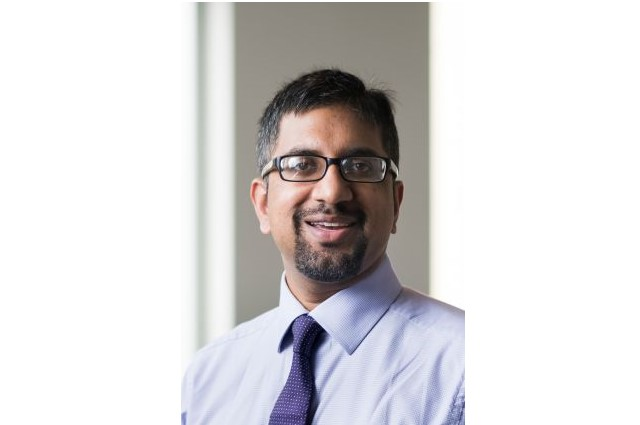-
About
-
Academics
- Physician Assistant
- Special Master’s (MBS)
-
Admissions & Financial Aid
- Tuition & Fees
-
Student Life
-
Research
- Research Labs & Centers
-
Local & Global Engagement
- Global Health Program
New Faculty - Ramnath Subbaraman
Tufts Public Health welcomes Ramnath Subbaraman, MD, the new Assistant Professor of Public Health and Community Medicine.

By Donald Clermont, MPH Candidate ‘18
Tufts University School of Medicine Public Health welcomes Ramnath Subbaraman, MD, Assistant Professor of Public Health and Community Medicine. Dr. Subbaraman comes to Tufts from Harvard Medical School where he was an Instructor in Medicine. Dr. Subbaraman received his MD from Yale University and his MSc in Epidemiology from Harvard University. As a physician and public health researcher, his time is split between clinical practice in infectious disease and public health research in India. His research focuses on: improving the delivery of health services for tuberculosis patients and investigating social determinants of health in urban slum settlements in India, which are highly dense shanty towns.
What drew you to working in India’s urban slums?
I’ve been working in Mumbai on and off since I finished college. At the University of Chicago, I was an anthropology major. Afterward, I interned with the Society for Promotion of Area Resource Centers and the National Slum Dwellers’ Federation under a University of Chicago human rights fellowship. Since that time, slum health has always been something that is of interest to me. I think that when you walk through these settlements, which are defined by what they lack—water, sanitation, marked by high density, with very unsafe housing structures and locations, and lacking in official legal status by the government at any level—you realize that these communities are a central question for public health in the 21st century, especially because about one billion people globally live in slums.
Did you know you were going into global health when you attended medical school?
I went into medical school knowing that global health was a big interest to me and that public health was too. Public health allows you to view issues from a wider perspective than just the biological level. When you walk through a slum settlement, the fundamental question isn’t at the molecular level—it involves much larger questions at the social and political levels.
What are some things you like about working as both a clinician and public health researcher?
I think being a clinician keeps me sane because there’s an immediacy that is the opposite of research. When I walk out of the hospital, I know that I’ve delivered certain benefits that, without me, wouldn’t have happened. Also, we spend so many hours training to be doctors that there is a sense of mastery over the work. Research is exactly the opposite. You can struggle for years and not know what the outcome will be and yet the potential for change at a systemic level or at some fundamental level of knowledge is much larger.
Why did you choose to come to Tufts University?
I chose Tufts for several reasons. One is that I wanted to be part of a public health department. The second is that I’m joining the PHCM’s Nutrition Infection Unit (NIU). The NIU thinks holistically about how healthcare should be delivered and it thinks about broader social questions because both nutrition and infectious diseases are fundamentally social issues. The third reason is that this is a really good transition for me as a junior researcher. Tufts is a good niche home to meet new people who might be interested in working together toward a common goal. That’s something I look forward to at Tufts.
What role do you think global health plays at Tufts?
Within the department and within the NIU, there are numerous people doing great global health work— Alice Tang and Odilia Bermudez, Associate Professors of PHCM, to name just two. I’m looking forward to learning more about the great work that people are already doing at Tufts.
What are your plans for the Center for Global Public Health?
I’ll be an Associate Director of the center and I look forward to being able to create a conversation around global health, largely by bringing together a lot of strengths that already exist at Tufts and leveraging the great work that people are already doing.
What are your plans for upcoming research?
The major focus of my research right now is on improving health care delivery for tuberculosis (TB). I’m collaborating on a study in India that is being driven on that end by colleagues at the National Institute for Research in Tuberculosis. I’m helping with an evaluation of a new adherence monitoring technology that uses cell phones. The rollout of this technology is part of some larger structural changes that are happening within the TB program in India. India has the world’s largest tuberculosis epidemic—with about 25% of the world’s tuberculosis cases and about a third of the world’s tuberculosis deaths. So, the work I am doing is exciting because it’s helping to rethink healthcare delivery within the world’s largest tuberculosis epidemic. I’m also working on revitalizing some of the slum health research my colleagues and I were doing in Mumbai. From 2010 to 2012, I spent a couple of years in Mumbai helping to run a project studying a non-notified (or illegal) slum settlement. I’ve done several studies in that one slum community since 2010 and I’m hoping to pull together the studies we have done into a book manuscript over the next few years. I hope to use health as a lens to look at larger questions regarding the social exclusion of certain populations within cities, and I think that a lot of the work I have done in India speaks to those questions.
Department:
Public Health and Community Medicine